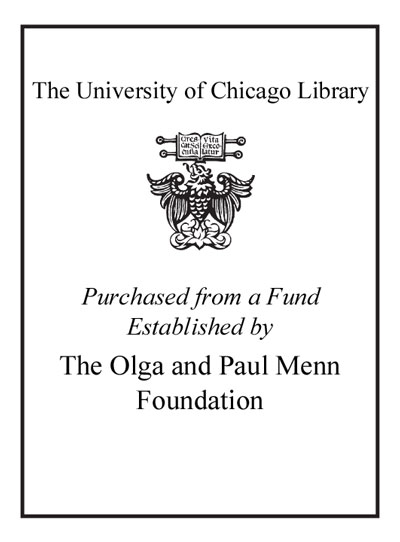Review by Choice Review
Every era has its defining figures, and the cultural world of the mid-20th century had, among others, John Cage. In this series of interviews, Cage's many voices--skeptical and optimistic, friendly and hostile, omniscient and humble, protean and rigid--are all audible and receive extended exposure. Cage thought of and referred to himself primarily as a composer, and nearly half the book is devoted to music; the rest of the volume treats words and visual art, for Cage interested himself in all and was to a degree practitioner of all. Appendixes offer examples of Cage's notations on a variety of matters pertaining to artistic production. The practice of recording interviews with artists has become epidemic in recent years, with mixed results. In this instance, as in most, the advantages of intimacy and improvisation are counterbalanced by disadvantages of unconsidered response, garrulity, and the limitations of the interviewer. Readers will want to dip in carefully since a read through will prove both tiresome and frustrating. Although one is unlikely to meet here a John Cage not already familiar, the editor does not provide a complete picture of Cage's often perplexing and iconoclastic persona. As with all things Cageian, the book will delight some and outrage others, no doubt to Cage's posthumous satisfaction. All collections. F. Goossen University of Alabama
Copyright American Library Association, used with permission.
Review by Publisher's Weekly Review
The celebrated avant-garde musician and thinker who died in 1992 is characterized by poet Joan Retallack as an American Zen master (though he had no formal Zen training); and, in the course of her three taped conversations with Cage that comprise most of the book (the last of them only days before his death), the aptness of the description becomes apparent. Cage's constant amusement, his endless curiosity, his insistence on seeing life and art always in a new way, emerge vividly. The result is in effect a study of his thought in motion as he sometimes playfully but always seriously responds to Retallack's informed and sympathetic questioning. As cellist Michael Bach joins the discussion to talk about his role in a Cage performance, a new work actually begins to unfold on the tape. The conversations at times seem to wander inconsequentially, but their impact as the record of a lively mind at work is all the greater as a result. At one point, Cage simultaneously welcomes the aleatoric nature of traffic noise while lamenting the inevitable air pollution that accompanies it. There are extensive appendixes of such things as timings and computer programs for some of Cage's works that will interest only specialists. For the most part, however, this is a highly accessible and personal introduction to a remarkable if elusive artist. (Oct.) (c) Copyright PWxyz, LLC. All rights reserved
(c) Copyright PWxyz, LLC. All rights reserved
Review by Library Journal Review
This compilation of Cage's most recent thoughts on art, language, and aesthetics is successful in large measure because of the thoughtful and intelligent questioning by Retallack, a poet and essayist with significant training in philosophy. Over the course of five lengthy conversations from 1990 to just 12 days before Cage's death in 1992, the two friends plumb some fascinating depths that reveal the unbuttoned landscape of Cage's mind. There is some repetition in these pages and quite a bit of minutiae that will interest only the most ardent aficionados. And most readers will doubtless lose patience with reprints of some of Cage's "mesostic texts"-writing in which comprehensibility is sacrificed to chance operations to create a sort of poetry for the eye. Still, the intellectual level is quite high, and even Cage's detractors will find themselves stimulated by many of the ideas presented on these pages. Recommended for both undergraduate and graduate-level collections.-Larry Lipkis, Moravian Coll., Bethlehem, Pa. (c) Copyright 2010. Library Journals LLC, a wholly owned subsidiary of Media Source, Inc. No redistribution permitted.
(c) Copyright Library Journals LLC, a wholly owned subsidiary of Media Source, Inc. No redistribution permitted.
Review by Kirkus Book Review
A philosophical discourse embodying a lifetime's aesthetic explorations by infamous composer John Cage (191292). In three extended conversations just prior to the composer's death, poet Retallack quizzed Cage on his work. The result, this compendium of Cagean thought, will baffle those unversed in his unique mixture of Zen Buddhism, American pragmatism, and Utopian anarchism. Students of Cage, on the other hand, will find much here repeated from past interviews and writings. But Cage, as always, is good company, a master aphorist who has an endless supply of pithy sayings (``If in doing something you do it without regard to itself, but to hearing it, it then is music''). Cage describes his compositional method, using chance operations to move away from asserting the composer's personality over the work to a process of endless discovery (``If you work with chance operations, you're basically shiftingfrom the responsibility to choose . . . to the responsibility to ask''). It is Cage's ideal to create art that does not reflect life but is life; for this reason, he admires Mark Tobey's paintings, because they enabled him to discover art in the everyday. Like James Joyce, Cage is an endless punster, enjoying the pun because it embodies his credo of ``interpenetration and nonobstruction''; two meanings can exist in the same ``space'' without either negating the other. Finally, Cage uses art as a kind of self-therapy. His fear of performance is underscored by his description of it as ``immanent danger''; the composer fears his work will be misunderstood, while the performer fears playing it wrong. But if a composition is merely a set of possibilities, then every performance by necessity must be right; neither composer nor performer can fail. Cagey thoughts that will surely knot your brow.
Copyright (c) Kirkus Reviews, used with permission.
Review by Choice Review
Review by Publisher's Weekly Review
Review by Library Journal Review
Review by Kirkus Book Review

